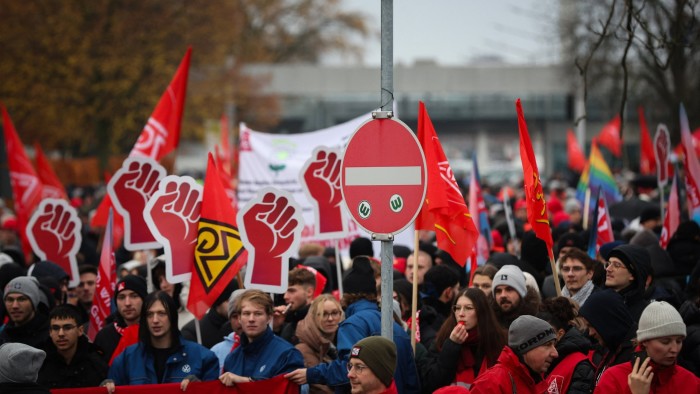Unlock the Editor’s Digest for free
Roula Khalaf, Editor of the FT, selects her favourite stories in this weekly newsletter.
Workers at Volkswagen’s plants in Germany are preparing to strike within weeks, as executives at Europe’s largest carmaker rejected their demand to rule out factory closures in the country.
“We will prepare for an escalation from the start of December,” IG Metall’s chief negotiator Thorsten Gröger said late on Thursday, at the end of labour talks that lasted more than six hours.
VW’s plans to close three German plants, eliminate tens of thousands of jobs and cut the pay of remaining workers by 10 per cent have come up against fierce resistance from the carmaker’s powerful works council and union.
VW has never closed a domestic plant in its 87-year history, and the crisis at the company has inflamed concerns over the health of Germany’s industry and its export-oriented business model.
Daniela Cavallo, VW’s works council chief who commands half the seats on the company’s supervisory board, has acknowledged that current market challenges, including declining European sales and shrinking market share in China, are structural.
But she has spurred VW’s executives to come up with a better product strategy for the future and argued labour costs should not be the sole focus of planned savings, which she has estimated at nearly €17bn.
The works council and union on Wednesday made an offer to forfeit €1.5bn in future pay rises, if the carmaker agreed to rein in bonuses for executives, curtail dividends and cancel plans to close factories.
The proposed package — the first concession in the increasingly tense stand-off between VW workers and managers — would lead to executives giving up parts of their bonuses in the next two years, as well as a “contribution through the dividend policy”.
The money saved would instead go into a “solidarity fund” to support wages during periods when plants were running at reduced capacity.
VW on Thursday said the drawn-out negotiations had focused on the workers’ proposal. The company’s chief negotiator Arne Meiswinkel, who did not attend the meeting because of illness, said it was a “positive signal that the employee representatives have shown openness to reducing labour costs”.
The proposal would, however, need to be studied closer to determine “whether it creates both sustainable financial relief for the company and offers clear prospects for the workforce”.
The initial production disruptions at VW are likely to be so-called warning strikes, which are temporary walkouts. These will now be allowed to take place from December 1 at the company’s factories in Wolfsburg, Salzgitter, Kassel, Emden, Hanover and Brunswick.
Talks are scheduled to resume on December 9, and Cavallo has said she wants to reach an agreement on the restructuring before Christmas.
Read the full article here

